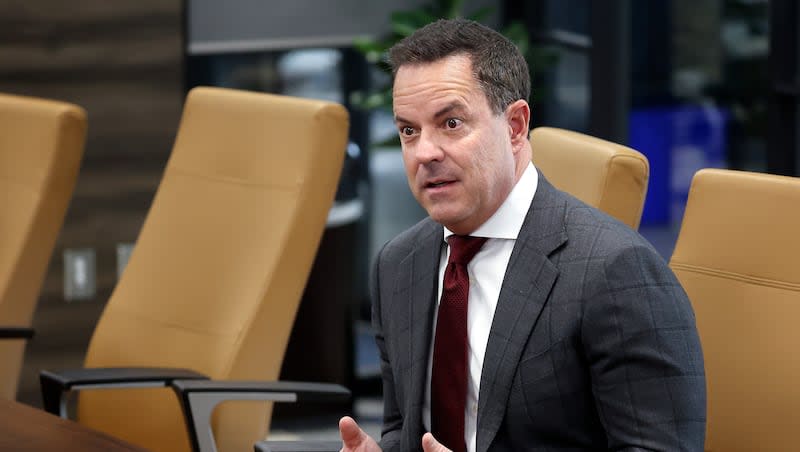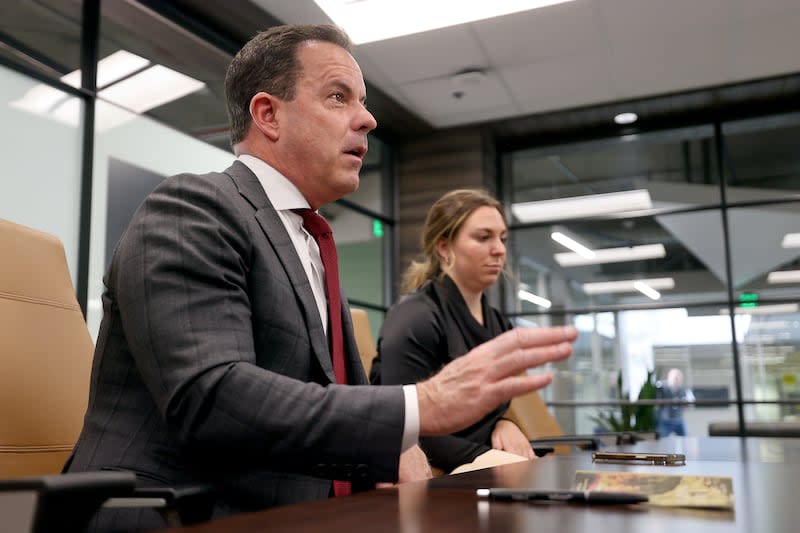Former House speaker Brad Wilson wants to ‘make Washington more like Utah’

Former Utah House Speaker Brad Wilson looked down at the list of U.S. Senate candidates on Jan. 8 and knew he was the most qualified to bring the Beehive State’s fiscal integrity to the dysfunction of Washington, D.C.
Half a decade as Utah’s top lawmaker taught him the ins and outs of balancing budgets and building coalitions, Wilson told the Deseret News editorial board on Thursday. It also gave him the leadership experience to do what voters say they want more than anything else, according to Wilson, “make Washington more like Utah.”
The concerns he hears from Garden City to Garfield County — almost always having to do with deficit spending, border security and the cost of living — have at their root the same systemic cause, Wilson said. Namely, a shortage of senators and representatives who “lean into issues,” “build coalitions” and “get things accomplished” the Utah way.
“It seems to me like D.C. is short on that kind of profile right now,” Wilson said.
In his bid to replace Sen. Mitt Romney among a crowded field of 11 Republican candidates, Wilson has made it his objective to prove he fits that profile better than anyone else.
What did Brad Wilson do as House speaker?
During his tenure, in what Gov. Spencer Cox has called the most difficult job in Utah politics, Wilson oversaw the passage of the largest tax cut in state history, a trigger law banning most abortions, an amendment allowing Utahns to carry a concealed gun without a permit and a statute preventing transgender individuals from participating in female school sports.
Wilson said his track record of policy wins on the state’s most complicated issues extends to water policy. Keeping the Great Salt Lake alive in a growing state amid a record drought dominated the final years of Wilson’s time in state office and resulted in an historic amount of money being directed toward water conservation.
But the issue that most motivated him at the state Capitol, and most angers him about Congress, is a bit more, well, “geeky,” Wilson said.
“No one up there understood the state of Utah’s budget better than I did,” Wilson said. “We’ve got to have that kind of expertise back in Washington.”

While it may not have made the headlines, one of Wilson’s proudest legislative achievements was restructuring Utah’s budget process, which he said has enabled the state in recent years to cut taxes and fund education at record levels, all while maintaining a AAA credit rating, scoring the nation’s best economic forecast and being named the best state overall in the country, largely due to fiscal stability.
“That really matters,” Wilson said. “Having someone that’s actually done that at Washington, D.C., I think would be pretty cool.”
What kind of senator would Brad Wilson be?
Wilson acknowledges that Congress’ checkbook couldn’t look more different than Utah’s.
With $34 trillion in national debt, and annual deficits regularly approaching or exceeding $2 trillion, federal lawmakers seem not to understand that “math is math,” Wilson said.
“I’m pretty angry about how lawmaking is done in Washington, D.C.,” Wilson said. “I believe that you should follow the model of Utah back in Washington where every department and every specific part of federal government has its own budget (and) lawmakers participate in crafting those budgets.”
Wilson said as Utah’s junior senator he would look to “cut the federal government budget everywhere,” support a balanced budget amendment and be willing to reform government retirement programs, like Social Security and Medicare, so that they’re intact, albeit in different forms, for future generations.
He’s not willing to compromise his values, Wilson said, but he is willing to work with Donald Trump, who he expects to win in November, and likeminded lawmakers on both sides of the aisle “that also care about this country’s future and want to solve some of the biggest problems.”
“I just have to hope that there is still a place back in Washington, D.C., for someone that’s a conservative but works well with others, is not going to compromise on their values but is going to really understand where people are coming from, to go back and get things done,” he said.
Can Brad Wilson become Utah’s next senator?
As one of the earliest candidates to announce his intention to run for Romney’s seat, Wilson entered the race with significant momentum.
At the end of 2023, Wilson carried a large fundraising lead over his opponents, with $1.7 million in donations — 90% of which are from Utahns, he said — and a $1.8 million self-funded loan, according to the Federal Election Commission.
He was also the first candidate in the race to qualify for the Republican primary ballot by gathering 28,000 certified signatures. Utah’s 3rd District congressman John Curtis and Moxie Pest Control CEO Jason Walton have also submitted their first tranche of 28,000 signatures to the Utah lieutenant governor’s office.
In county GOP straw polls among state delegates, Wilson has consistently come in first or second place. He won delegate preference polls in Cache and Washington counties in February by significant margins.
A second Washington County straw poll on March 23 saw him finish in second place behind Riverton Mayor Trent Staggs, while polling ahead of Curtis, political adviser Carolyn Phippen and lawyer Brent Hatch.
Wilson received more than 50% of delegate support in a Wayne County vote on March 29.
On Saturday, Wilson said he became the first candidate to visit all 29 counties in Utah. His campaign has emphasized endorsements from more than 50 Utah mayors, three-fourths of Utah sheriffs, more than half of state legislators and Cox.
The Republican state convention will be held on April 27. Candidates who receive more than 40% of delegate votes, or who have gathered enough verified signatures, will appear on the primary ballot on June 25.
The GOP nominee who emerges from the primary will face off against the nominees from other registered political parties in the Nov. 5 general election.
Other Republican candidates, besides those already named, include certified public accountant Josh Randall, Bookroo founder Chandler Tanner, Brian Jenkins, Jeremy Friedbaum and Clark S. White.
The Democratic candidates for U.S. Senate in Utah include mountaineer Caroline Gleich, Archie Williams III and Laird Hamblin.

